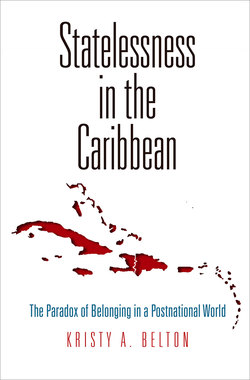Statelessness in the Caribbean

Реклама. ООО «ЛитРес», ИНН: 7719571260.
Оглавление
Kristy A. Belton. Statelessness in the Caribbean
Отрывок из книги
Statelessness in the Caribbean
Bert B. Lockwood, Series Editor
.....
Reconceptualizing statelessness as a form of forced displacement in situ is important for several reasons. First, statelessness is a human rights issue that most people do not know exists. As UNHCR admitted, it is “one of the most neglected areas of the global human rights agenda” (UNHCR 2011b, 2). While the plight of refugees, IDPs, and other forced migrants has garnered the attention of the international, humanitarian, policy-making, and scholarly communities over the decades, statelessness has not. It is only in the past three years that the first Global Forum on Statelessness34 was held and that UNHCR launched its global #IBelong Campaign to End Statelessness, even though statelessness has existed since before the organization’s inception and is one of its primary mandates. It is also only in the past few years that scholarly interest in the subject has begun to develop and that regional intergovernmental organizations, such as the OAS and the European Union (EU),35 have begun to address the issue.
The lack of attention given to statelessness is problematic because stateless people, as I describe in Chapters 2 and 5, are susceptible to a range of human rights violations as noncitizens everywhere. As UN Secretary General (UNSG) António Guterres declares, “The daily suffering of millions of stateless people is an affront to humanity” (cited in van Waas 2013, n. pag.). Yet because their situation typically lacks the humanitarian or emergency nature of other types of forced displacement—they may live in democracies and face little to no persecution; they may have never had to leave their home due to conflict or crisis; they may outwardly appear like any citizen you meet—their particular plight has often gone unrecognized or been made secondary to other human rights concerns. But, as I explain later in the text, statelessness is an insidious form of displacement, with invidious effects. Reconceptualizing statelessness as forced displacement in situ thus demands that we consider statelessness as important to address as other types of forced displacement.
.....